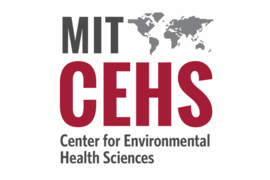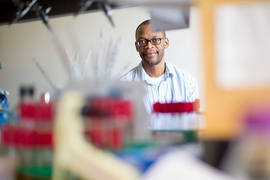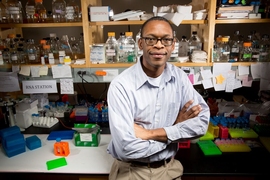Professor of biological engineering Jacquin C. Niles has been named director of the MIT Center for Environmental Health Sciences (CEHS), effective April 1.
“Jacquin’s background in infectious disease will bring new dimensions to CEHS and will open up the research in the lab to a broader cross-section of the MIT research community,” says Vice President for Research Maria Zuber. Niles succeeds John M. Essigmann, the William R. and Betsy P. Leitch Professor in Residence of Chemistry, Toxicology, and Biological Engineering, who held the post for the past seven years.
Jacquin’s research activities are motivated by a longstanding interest in improving human health through multidisciplinary research. His current research in infectious diseases has focused on malaria, a parasitic disease of major global health impact and the cause of substantial morbidity and mortality. His research group has been developing new technologies to improve understanding of malaria parasites, their interaction with the human host to cause disease, and for advancing novel approaches to antimalarial drug and therapeutics discovery.
The MIT Center for Environmental Health Sciences is an interdisciplinary P30 Core Center funded by the National Institute of Environmental Health Sciences. The center’s mission is to study the biological effects of environmental agents, individually and in combination, with specific emphasis on how such exposures affect human health and the health of our ecosystem.
“The interplay between infectious diseases and environment is increasingly being recognized as critical for understanding susceptibility to environmental exposures and shaping health outcomes in human populations,” Niles says. “I believe that MIT CEHS is uniquely well-positioned to make impactful contributions in this area, and I am excited to expand CEHS’ research activities in these areas while continuing to build on its existing strengths.”
Environmental health research at MIT encompasses a wide range of disciplines, and CEHS continues to bring together faculty members who employ a diverse set of research tools to tackle problems relevant to environmental health sciences. During the past several years, CEHS has begun to include focused efforts on problems of particular relevance to the developing world, along with adding more human population-based studies. CEHS has also increasingly engaged the MIT engineering community, as engineering colleagues are critical players on the front lines to address the reality of environmental hazard remediation.
Niles plans to collaborate closely with Essigmann, who will remain part of the CEHS leadership team, serving as deputy director during this transition. Zuber thanked Essigmann for his dedicated leadership in her announcement of the new director to CEHS community, saying, “Under John’s thoughtful direction, the Center has thrived with enhanced engagements with the local and national community; new connections forged with MIT faculty; and reorganized and strengthened programs.”
Niles first came to MIT as an undergraduate and obtained a BS in Chemistry in 1994. He completed MD/PhD training through the Harvard-MIT Health Sciences and Technology program and completed his graduate thesis work at MIT with Professor Steven Tannenbaum in the Division of Toxicology (now Biological Engineering). His graduate work emphasized chemical characterization of DNA damage caused by exposure to chronic inflammation, toward understanding the biological basis for increased cancer risks associated with various inflammatory diseases. He completed postdoctoral work with Professor Michael Marletta in Chemistry at the University of California at Berkeley, before returning to MIT to join the faculty in 2008.
Niles has received an NIH Director’s New Innovator Award and a Bill and Melinda Gates Foundation Grand Challenges Award, and is a HHMI-Gates Faculty Scholar. He presently serves as co-director of the MIT Microbiology Graduate Program, an interdepartmental and interdisciplinary graduate PhD program that integrates educational and research resources to provide broad fundamental and applied training experiences in microbial systems.
Zuber says, “We look forward to working with Jacquin as he implements his vision for the future of CEHS, and we know he will receive strong support from the entire CEHS community to make the center’s future an overwhelming success.”









